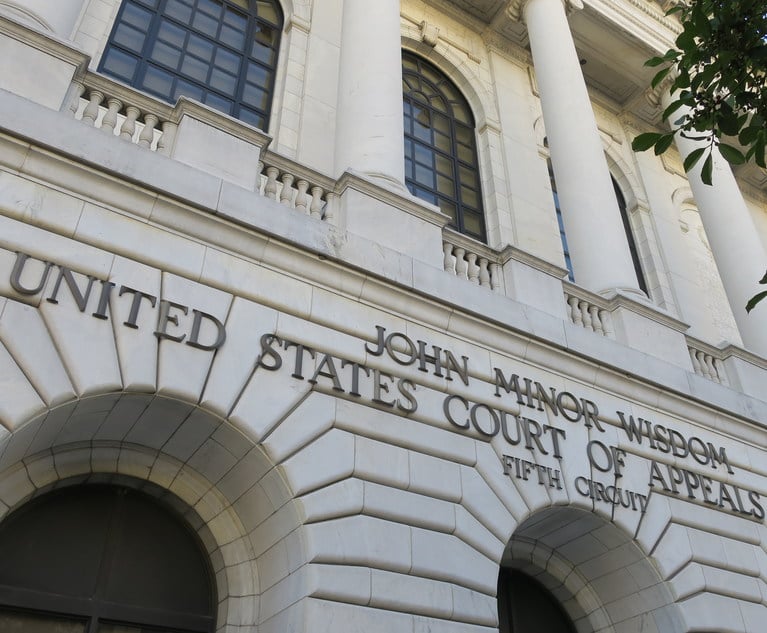 Photo: Shutterstock
Photo: ShutterstockCiting Lower Court Error, Child Paternity Ruling Reversed
A support magistrate in Manhattan's Family Court acted outside the scope of her statutory authority by resolving “issues of contested paternity involving claims of equitable estoppel," an appellate panel has ruled.
January 10, 2019 at 06:04 PM
3 minute read
A support magistrate in Manhattan's Family Court acted outside the scope of her statutory authority by resolving “issues of contested paternity involving claims of equitable estoppel” and, as a result, the magistrate's judgment that a man is the father of a child must be reversed, a state appeals court has ruled.
An Appellate Division, First Department, panel has decided that the man, referred to only as Travis S. in the opinion, is entitled to further proceedings regarding his apparent contesting of being the father of the child, for whom support is being sought.
The unanimous panel pointed to errors made by both Support Magistrate Linda Safron and an unnamed Family Court judge at appearances by Travis S. before them in 2017, during which he sought—at least at his first appearance—to have a DNA test ordered.
It now appears Travis S. will have further proceedings at which he can file a motion to vacate the default or re-calendar his case and then perhaps pursue again his DNA test request.
The panel, composed of Justices David Friedman, Rosalyn Richter, Ellen Gesmer, Cynthia Kern and Peter Moulton, wrote in its Jan. 3 opinion that the paternity order resolving “issues of contested paternity involving claims of equitable estoppel” raised by the child was outside of the scope of Safron's authority as set out in Family Court Act Section 439 (a), (b).
In addition, the justices wrote, so were the Aug. 1, 2017, proceedings resulting in the order and Safron's issuance of a determination, before Family Court had considered the estoppel issue, that Travis S. couldn't obtain a DNA test.
Moreover, the panel said the record “shows that the Family Court judge who was to have heard [Travis S.'s] request for a DNA test and the estoppel issue on May 15, 2017, did not wait for [Travis S.] to join his attorney in the courtroom before denying [his] request.”
Then, when Travis S. soon appeared before Safron without his lawyer, she gave him “technical instructions for counsel about the procedure and substance of the motion to be filed to have the matter heard by a judge,” the panel pointed out.
“Given this, and because [Travis S.] appeared at the August 1, 2017 proceedings prepared to file his motion to vacate the default or re-calendar the case, this was not an ordinary default situation for purposes of CPLR 5511, even though his attorney stood mute at those proceedings,” the panel wrote, adding that Safron had “abused her discretion by denying [Travis S.'s] request to adjourn the proceedings where [he] needed the adjournment … to file the motion.”
Lewis Calderon, a lawyer for Travis S., could not be reached for comment. The city's Law Department, which, according to the First Department decision, represented the petitioner in In re Caroline D. v. Travis S., did not respond to a request for comment.
Attorney Shirim Nothenberg, with the Lawyers for Children Inc., represented the child, and she declined to comment Thursday.
This content has been archived. It is available through our partners, LexisNexis® and Bloomberg Law.
To view this content, please continue to their sites.
Not a Lexis Subscriber?
Subscribe Now
Not a Bloomberg Law Subscriber?
Subscribe Now
NOT FOR REPRINT
© 2025 ALM Global, LLC, All Rights Reserved. Request academic re-use from www.copyright.com. All other uses, submit a request to [email protected]. For more information visit Asset & Logo Licensing.
You Might Like
View All


Legal Issues to Watch in the US Appeals Courts in 2025

Second Circuit Upholds $5M Judgment Against Trump in E. Jean Carroll Case
4 minute readTrending Stories
Who Got The Work
Michael G. Bongiorno, Andrew Scott Dulberg and Elizabeth E. Driscoll from Wilmer Cutler Pickering Hale and Dorr have stepped in to represent Symbotic Inc., an A.I.-enabled technology platform that focuses on increasing supply chain efficiency, and other defendants in a pending shareholder derivative lawsuit. The case, filed Oct. 2 in Massachusetts District Court by the Brown Law Firm on behalf of Stephen Austen, accuses certain officers and directors of misleading investors in regard to Symbotic's potential for margin growth by failing to disclose that the company was not equipped to timely deploy its systems or manage expenses through project delays. The case, assigned to U.S. District Judge Nathaniel M. Gorton, is 1:24-cv-12522, Austen v. Cohen et al.
Who Got The Work
Edmund Polubinski and Marie Killmond of Davis Polk & Wardwell have entered appearances for data platform software development company MongoDB and other defendants in a pending shareholder derivative lawsuit. The action, filed Oct. 7 in New York Southern District Court by the Brown Law Firm, accuses the company's directors and/or officers of falsely expressing confidence in the company’s restructuring of its sales incentive plan and downplaying the severity of decreases in its upfront commitments. The case is 1:24-cv-07594, Roy v. Ittycheria et al.
Who Got The Work
Amy O. Bruchs and Kurt F. Ellison of Michael Best & Friedrich have entered appearances for Epic Systems Corp. in a pending employment discrimination lawsuit. The suit was filed Sept. 7 in Wisconsin Western District Court by Levine Eisberner LLC and Siri & Glimstad on behalf of a project manager who claims that he was wrongfully terminated after applying for a religious exemption to the defendant's COVID-19 vaccine mandate. The case, assigned to U.S. Magistrate Judge Anita Marie Boor, is 3:24-cv-00630, Secker, Nathan v. Epic Systems Corporation.
Who Got The Work
David X. Sullivan, Thomas J. Finn and Gregory A. Hall from McCarter & English have entered appearances for Sunrun Installation Services in a pending civil rights lawsuit. The complaint was filed Sept. 4 in Connecticut District Court by attorney Robert M. Berke on behalf of former employee George Edward Steins, who was arrested and charged with employing an unregistered home improvement salesperson. The complaint alleges that had Sunrun informed the Connecticut Department of Consumer Protection that the plaintiff's employment had ended in 2017 and that he no longer held Sunrun's home improvement contractor license, he would not have been hit with charges, which were dismissed in May 2024. The case, assigned to U.S. District Judge Jeffrey A. Meyer, is 3:24-cv-01423, Steins v. Sunrun, Inc. et al.
Who Got The Work
Greenberg Traurig shareholder Joshua L. Raskin has entered an appearance for boohoo.com UK Ltd. in a pending patent infringement lawsuit. The suit, filed Sept. 3 in Texas Eastern District Court by Rozier Hardt McDonough on behalf of Alto Dynamics, asserts five patents related to an online shopping platform. The case, assigned to U.S. District Judge Rodney Gilstrap, is 2:24-cv-00719, Alto Dynamics, LLC v. boohoo.com UK Limited.
Featured Firms
Law Offices of Gary Martin Hays & Associates, P.C.
(470) 294-1674
Law Offices of Mark E. Salomone
(857) 444-6468
Smith & Hassler
(713) 739-1250






